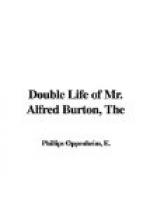Burton sat for some time without reply. For a moment the strong wave of humanity which swept up from his heart and set his pulses leaping, set the music beating in the air, terrified him. Surely this could mean but one thing! He waited almost in agony for the thoughts which might fill his brain.
“Miss Cowper,” Mr. Bomford continued, “has been much upset since your hasty departure from Leagate. She is conscious of some mistake—some foolish speech.”
Burton drew a little sigh of relief. After all, what he had feared was not coming. He saw the flaw, he felt even now the revulsion of feeling with which her words had inspired him. Yet the other things remained. She was still wonderful. It was still she who was the presiding genius of that sentimental garden.
“You are very kind,” he murmured.
“We shall expect you,” Mr. Bomford declared, “at a quarter past eight this evening.”
CHAPTER XXIII
Condemned!
To Burton, who was in those days an epicure in sensations, there was something almost ecstatic in the pleasure of that evening. They dined at a little round table in the most desirable corner of the room—the professor and Edith, Mr. Bomford and himself. The music of one of the most famous orchestras in Europe alternately swelled and died away, always with the background of that steady hum of cheerful conversation. It was his first experience of a restaurant de luxe. He looked about him in amazed wonder. He had expected to find himself in a palace of gilt, to find the prevailing note of the place an unrestrained and inartistic gorgeousness. He found instead that the decorations everywhere were of spotless white, the whole effect one of cultivated and restful harmony. The glass and linen on the table were perfect. There was nowhere the slightest evidence of any ostentation. Within a few feet of him, separated only by that little space of tablecloth and a great bowl of pink roses, sat Edith, dressed as he had never seen her before, a most becoming flush upon her cheeks, a new and softer brilliancy in her eyes, which seemed always to be seeking his. They drank champagne, to the taste and effects of which he was as yet unaccustomed. Burton felt its inspiring effect even though he himself drank little.
The conversation was always interesting. The professor talked of Assyria, and there was no man who had had stranger experiences. He talked with the eloquence and fervor of a man who speaks of things which have become a passion with him; so vividly, indeed, that more than once he seemed to carry his listeners with him, back through the ages, back into actual touch with the life of thousands of years ago, which he described with such full and picturesque detail. Not at any time during the dinner was the slightest allusion made to that last heated interview which had taken place between the three men. Even when they sat out in the palm court afterwards, and smoked and listened to the band and watched the people, Mr. Bomford only distantly alluded to it.




